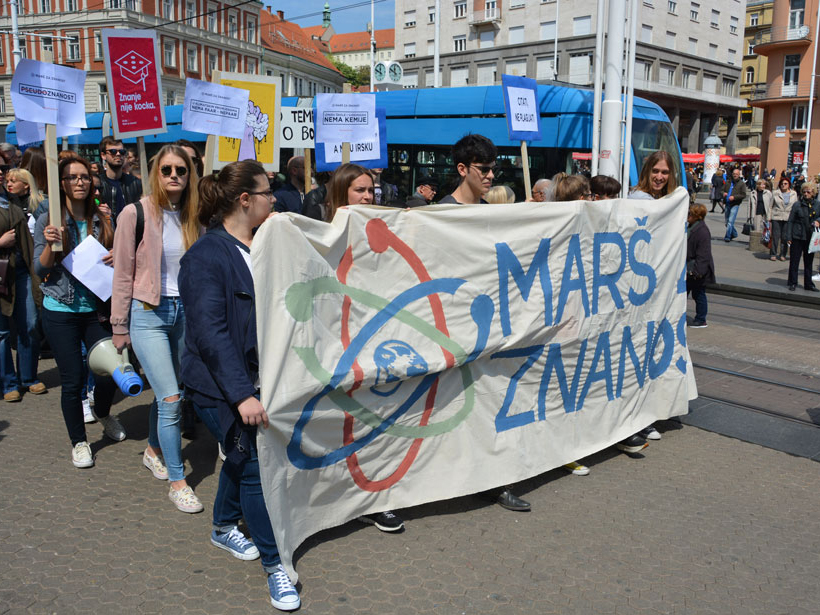Frustration is mounting over nationalist policies in the United States and other countries that are obstructing the free exchange of ideas and effective collaboration among scientists.
These policies have multiple impacts. The most immediate and visible human tragedies are borne by refugees and immigrants. At the same time, several academics have lost their jobs or their ability to carry out their missions where nationalist governments have restricted academic freedoms and defunded science and education. Sadly, enrollment of foreign students in U.S. universities appears to be on the decline, perhaps due to uncertainties regarding visas and concerns over reported xenophobic sentiments that our leaders appear to condone. Tightening visa restrictions in the name of national security also impedes the ability of scientists to work collaboratively to advance scientific discovery that benefits humanity.
While these trends are widespread, the actions and words of the Trump administration are receiving particular attention, for good reason. While we must respect differences of opinion regarding immigration policy and national security, we cannot remain silent when human dignity is violated, as we have recently witnessed. Equally disturbing are statements and actions that disregard the value of science-based evidence in policy making. So what are the appropriate responses for scientific societies like the American Geophysical Union (AGU) and its international membership? With about 40% of our members from outside of the United States, this question clearly extends beyond American politics.
Support “What Science Stands For”
The negative impacts of boycotts of scientific meetings in America would not be felt by this administration, but the consequences for our science would be very real, indeed!
We must stand together to insist that scientific collaboration remain international and interdisciplinary. I can certainly empathize with those outside the United States who might be considering boycotting meetings in America as a protest to several of President Trump’s policies and statements. But I would argue that such boycotts would simply advance the type of nationalism that we need to stand up against. The negative impacts of boycotts would not be felt by this administration, but the consequences for our science would be very real, indeed! As we face global challenges of managing the Earth system with human populations destined to exceed 8 and 9 billion people, we urgently need the diverse scientific expertise and cultural perspectives that international meetings offer to find effective solutions.
This year’s AGU Fall Meeting in Washington, D. C., is a particularly opportune time for showing solidarity. In addition to engaging key administration officials and bipartisan representatives of the U.S. Congress, we are inviting science attachés from several embassies and international agencies located in Washington. As always, the scientific program addresses Earth and space research. Consistent with this year’s theme of “What Science Stands For,” the program will also feature sessions on ethics and workplace issues, such as sexual harassment, diversity, and inclusion, and on career development matters, such as tenure and promotion. These topics are universally relevant, but they often have important culturally specific aspects that require diverse perspectives.
Based on what we are hearing from our members, I pledge that we will add a session on promoting international science in an increasingly nationalist world. We need you to help us stand up for “What Science Stands For.”
Communicating in Washington and Beyond
Although solidarity at meetings sends a huge signal, AGU is also working diligently in quieter ways. We are advancing bipartisan support in the U.S. Congress for science funding and policies protecting scientific integrity. We have established good working relationships with key administration appointees and career professionals within the agencies who are dedicated to advancing science. We are providing training and tool kits for our members across the world to learn to tell their stories effectively to community groups, school groups, congregations, businesses, the media, and decision-makers at all levels. Engaging broadly in civil society to demonstrate the importance of science to society will be our most enduring strategy to counter the shifting political winds that follow election cycles and nationalist movements.
Science always benefits from diversity, and this is no time to allow the political climate in the United States and elsewhere to deter us from making our science great by fostering diverse contributions from our international membership. Whether it is this year’s AGU meeting in Washington, D. C., or any other scientific society’s meeting in the United States or elsewhere, I call on scientists across the globe to show solidarity for our shared values and to advance international science for the benefit of humanity.
—Eric Davidson (email: [email protected]), President, AGU
Editor’s note: A copy of this Eos opinion piece appears in AGU’s From the Prow blog.
Citation:
Davidson, E. (2018), Solidarity among world’s scientists needed now more than ever, Eos, 99, https://doi.org/10.1029/2018EO103307. Published on 25 July 2018.
Text © 2018. The authors. CC BY-NC-ND 3.0
Except where otherwise noted, images are subject to copyright. Any reuse without express permission from the copyright owner is prohibited.

